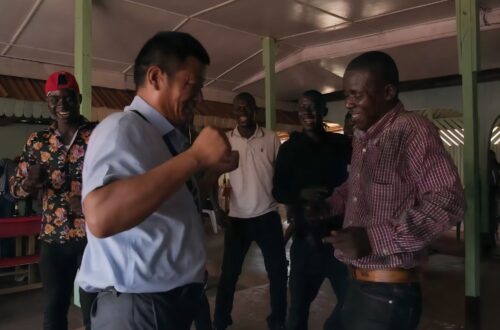Netflix doc ‘Found’: Three teenage girls seek roots in China
'Found' offers an on-the-ground, humanistic look at China through the eyes of three teenage adoptees.

On October 20, Netflix will release the documentary Found, which follows three teenage Chinese-American adoptees. Chloe starts the movie living in Israel, Sadie works at a fast food restaurant in Tennessee, and Lily, distinguished by a prominent underbite, is seen graduating from high school in Oklahoma. When a genetics test confirms these three girls to be cousins, they bond over Zoom meetings over their shared background, and plan an ambitious trip to Guangdong province in southeast China to find their roots.
China itself is only vaguely relevant — these are all teenage girls dealing with, well, all the things teenage girls deal with. But the movie really picks up when the girls (and their parents) start negotiating with Liu, a tour guide who also specializes in genealogy. The three girls, bubbling with enthusiasm and naïveté, decide to meet in China.
In contrast to our wide-eyed teenagers, Liu the agent is grounded, practical, and world-wise. She’s passionate about her job, and within minutes we learn more about the background of the girls than we had in the first 20 minutes. It turns out that all the children in this particular area of Guangdong were routed to a specific orphanage. The girls’ family background all take them to the same area because their families lived close to one another. It is implied that the girls’ biological parents may not have known each other all that well, if at all. It’s never made entirely clear exactly how they’re related.
Found doesn’t address issues of displacement directly. For the most part, the documentary is a straightforward piece about teenage girls getting in touch with their origins — and for American audiences, a rare on-the-ground look at China through a humanistic lens. While there’s nothing wrong with this, it does leave more to be desired, especially if you’re a viewer less interested in sentimental teenagers than how the Chinese adoption process works.
Rather than getting into proper research centered around Liu, whose explanations of her investigative process are genuinely interesting, Found falls back on cliches. Director Amanda Lipitz implies that the girls’ biological parents were dealing with difficult situations and most likely did not want to give up their children, but the hard truth is that adult adoptees are often warned to not get their hopes up about finding their biological parents, for fear that they won’t like what they find. Liu also makes this point to the girls, it’s just underemphasized in the broader sentiment of the film.
The scenes that resonated the most with me didn’t involve the three girls at all — such as one part in which a Chinese family is identified as a strong candidate to be blood relatives. In general, Liu’s investigations are heartbreaking. One story featuring a family who owns a small hole-in-the-wall shop is especially brutal. The embarrassed woman requests her face be obscured as she tells a story about giving up her daughter due to intense social pressure. I was genuinely touched when her story received a proper postscript. Yet I was also a bit annoyed, because she’s a supporting character at best. The adults in this movie who have the most to say are paradoxically the ones who get to speak the least.
If I’m sounding overly critical, the reason is that I’m used to more nuanced and fact-centered approaches to the international adoption issue, due to my professional specialty being South Korean films, which also includes those from the diaspora. South Korea has a much older history with international adoptions than China, and adoptees have been making their own movies and setting their own narratives for quite some time. Earlier this year saw the release of Forget Me Not — A Letter to My Mother from Danish filmmaker Sun Hee Engelstoft. In it, Englesoft goes inside a young unwed mother’s home and observes with anguish how all the girls she meets there want to keep their babies, yet are bitterly pressured by family to give them up. I still think about how Engelstoft broke into tears at the press screening while reliving the experience. That was a movie with an argument.
Even on the lighter side, Found is outshone by Twinsters, a 2016 documentary made by the title characters. They meet via social media and are willing to look critically at their life experiences as adoptees. They go deeper into their backgrounds, speculate about how it’s affected their temperaments, and come to peace with what they learn about their biological mother.
But even if Found is ultimately unsatisfying, it is the only documentary available to a mainstream American audience when it comes to international Chinese adoptions. Its approach, however flawed, is better than nothing. The movie was produced by Anita Gou of The Farewell, and the documentary will likely appeal to the same target audience. It’s not a bad film, but just speaking for myself, it left me desiring something with more substance.







